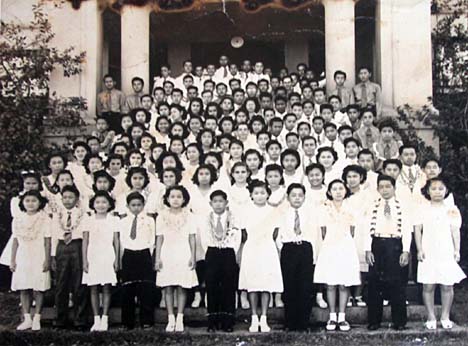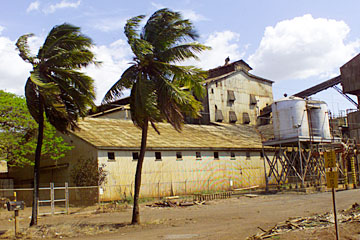


Paia recalls history PAIA, Maui >> Attorney Meyer Ueoka recalled making diving goggles out of plumeria branches and kites out of newspaper, bamboo and flour, when he was a youth in Paia in the early 1900s.
rooted in sugar
A reunion Aug. 17-19 gives past
residents a chance to talk
about old plantation daysLuau, entertainment at reunion
By Gary Kubota
gkubota@starbulletin.com"We had to be creative because we didn't have things at that time," said Ueoka, 81, son of a Zen Buddhist priest and one of 10 children in his family.
As the Greater Paia Reunion takes place on Aug. 17-19, Ueoka and thousands of other people are expected to gather to recall stories of growing up in this former sugar town and its role as a foothold for immigrants entering the United States.
Along Baldwin Avenue, the smoke no longer billows from the Hawaiian Commercial & Sugar Co. mill, and dirt roads no longer lead to the more than a dozen plantation camps scattered for about six miles from Hamakuapoko to Spreckelsville.
But a number of buildings from the plantation era serve as reminders of the Paia's past, including wooden store fronts in the town and Paia School, where thousands of immigrant children received the beginnings of a education.
Their families survived among the most difficult of economic times in Hawaii in the last century, including the Great Depression and World War II.
Some former residents say they don't know how their parents managed to find a place to sleep all their brothers and sisters in the two or three-bedroom houses built by the plantation.
They say they never thought of themselves as being poor mainly because most people they knew were living under the same conditions.
They do remember the informal sharing that occurred from groups gathering to pool their money to neighbors who occasionally gave them vegetables and fish.
Sam Araki said he was 10 when his father died, leaving his mother to make a living at their grocery store and raise her children.

Araki, 58, recalled his mother occasionally let steady customers watch her store as she went dashing back home with a can of Spam and eggs as lunch for the children.Araki said he drove a truck to deliver groceries to camps, many in the middle of sugarcane fields, and got to know many people.
"It made the community close-knit," he said. "You kind of knew what everybody else did."
Joseph W. Borges, 72, said he enjoyed participating in the plantation sports with youths of different races and remembers with fondness the smells of special holiday meats and Portuguese sweet bread baked in stone ovens by his mother and relatives.
"It was really great," he said. "The whole atmosphere was a great blend."
Part of the plantation atmosphere was also manual labor.
Ueoka said in addition to diving for fish, family members raised chickens and hogs and had a vegetable garden.
In the 1930s at age 14, he worked with a sugar plantation crew, using a hoe to pull out weeds for 25 cents a day.
He went to school barefoot as did most Paia children.
"I didn't own a shoe until the 8th grade," he said.
Ueoka, a state Board of Education member and former state legislator, said what he got most out of his experience living in Paia was the high regard for community service and people helping others.
"It instilled in us something we wanted to do for the community," he said.
The public is invited to attend events at the Greater Paia Reunion from Friday through Sunday at Paia School along Baldwin Avenue. Luau, entertainment at reunion
Star-Bulletin staff
Registration, which costs $1, takes place on Friday from 1:30 p.m. to 3 p.m., followed by entertainment until 9 p.m.
The luau from 5 p.m. to 6:30 p.m. costs $12 a person.
On Saturday, ceremonies will begin at 9 a.m. with various government officials, including Maui Mayor James Apana, delivering speeches, followed by entertainment through 9 p.m.
Luau tickets may be purchased through the Internet at greaterpaiareunion.com or mailing payments to Greater Paia Reunion, P.O. Box 61, Kahului, HI 96732, or contact George Ito, 871-4026.